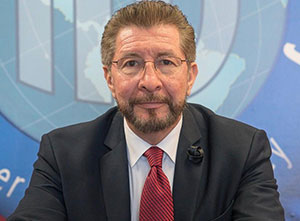The ongoing attack of 21st-century socialism on Ecuador to overthrow democracy

By: Carlos Sánchez Berzaín - 05/10/2025
Share:
Organized crime focuses its attacks on the people, the government, and democracy in Ecuador, because it is the only country that has freed itself from the 21st-century socialist system that oppressed it for more than ten years under the regime of Rafael Correa, who established a narco-state, amended the Constitution, destroyed institutions, violated human rights, and implemented state terrorism as a form of government under the command of Cuba and Venezuela. Once democracy is restored, 21st-century socialism constantly attacks Ecuador to sustain its criminal organization.
Ecuador was a dictatorship of 21st-century socialism, or Castro-Chavism, during the regime of Rafael Correa, which eliminated all essential elements of democracy. With institutionalized human rights violations, political prisoners and exiles, confiscations, persecutions, total state control, claims that Correa was the ruler of all power, protection of Colombia's narco-terrorist guerrillas, anti-imperialist rhetoric, developmentalism with hypercorruption, assassinations, cover-ups, electoral fraud, a constituent assembly to supplant the Republic, and more, Correa made Ecuador part of the transnational organized crime controlled by the Cuban dictatorship.
Lenin Moreno interrupted the dictatorship and chose freedom, restoring the essential elements of democracy. His involvement in the dictatorial system under Correa, his involvement as the dictator's vice president, and his involvement in the dictatorship are just some of the signs that emphasize Lenin Moreno's courage in leading the break with organized crime and choosing the path of freedom—the most difficult path, but the only one that can vindicate the honest and intelligent practice of politics for which history will recognize him.
In addition to replacing dictatorship with democracy, President Moreno pointed out the corruption and state crimes committed by the dictator and his accomplices, resisted the coups and attacks perpetrated by 21st-century socialism, and held free and fair elections that allowed for a democratic succession to the presidency of Guillermo Lasso, who later fell victim to harassment by organized crime that ultimately cut short his term.
Since the return to democracy in Ecuador under Lenin Moreno, the constant strategy of 21st-century socialism has been conspiracy, terrorist attacks, attempts to empower organized crime, the fight for impunity, the character assassinations, the intimidation of civil and social leaders, murders like that of Fernando Villavicencio, street-heating, contract killings, and the entire baggage of "hybrid warfare," which includes remaining "legitimate actors" in politics.
In and against Ecuador, the dictatorships/narco-states of 21st-century socialism conspire and operate under the command of Cuba, Venezuela, Nicaragua, and Bolivia; the para-dictatorial governments of Mexico under López Obrador and now Sheinbaum, Brazil under Lula da Silva, Colombia under Petro, Honduras under Castro; the system's narco-guerrillas like the FARC and the ELN; criminal groups from the same organization like the Tren de Aragua, the Maras, and various cartels, including the "Cartel of the Suns" that controls Venezuela. All of this is sustained by communication networks, lobbies, international relations, and extracontinental dictatorships.
Lenin Moreno was repeatedly overthrown and assassinated, to the point that he had to move his government out of Quito; Guillermo Lasso was overthrown and neutralized until he had to resort to a "death crusade" to save democratic institutions and achieve an honorable exit; Fernando Villavicencio was simply assassinated, and everything points to the leaders of 21st-century socialism as the masterminds behind the assassination; now the same strategy is being applied to President Daniel Noboa to create ungovernability, destroy his reputation, and end his term.
The point is that even though Ecuador has returned to democracy, institutional recovery is not complete. Twenty-first-century socialism, or Castro-Chavism under the banner of Correísmo or Citizens' Revolution, changed the constitution and imposed a socialist system, supplanting the institutions of the Republic with mechanisms of impunity and control. Organized crime now operates a significant part of Ecuador's political and institutional system. These are the Correísmo officials who have not been replaced because they have the backing of the dictatorial legal system that has not yet been dismissed.
21st-century socialism urgently needs to recover Ecuador, and to do so, it must overthrow President Noboa, which is what it is now attempting to do again. This is to restore the narco-state, to free its imprisoned criminals, to overturn the final sentences against Rafael Correa and his accomplices for well-known and publicly acknowledged crimes. This is to do what the intervention of the governments of Cuba, Mexico, Colombia, and Venezuela has failed to achieve in recent years, and once again overrule the will of the Ecuadorian people, who yearn for freedom and security.
*Lawyer and Political Scientist. Director of the Interamerican Institute for Democracy
«The opinions published herein are the sole responsibility of its author».